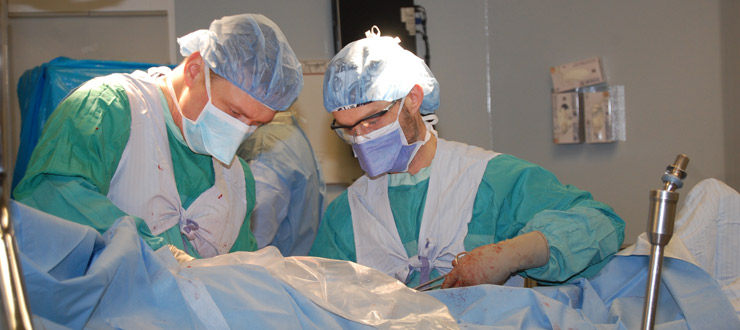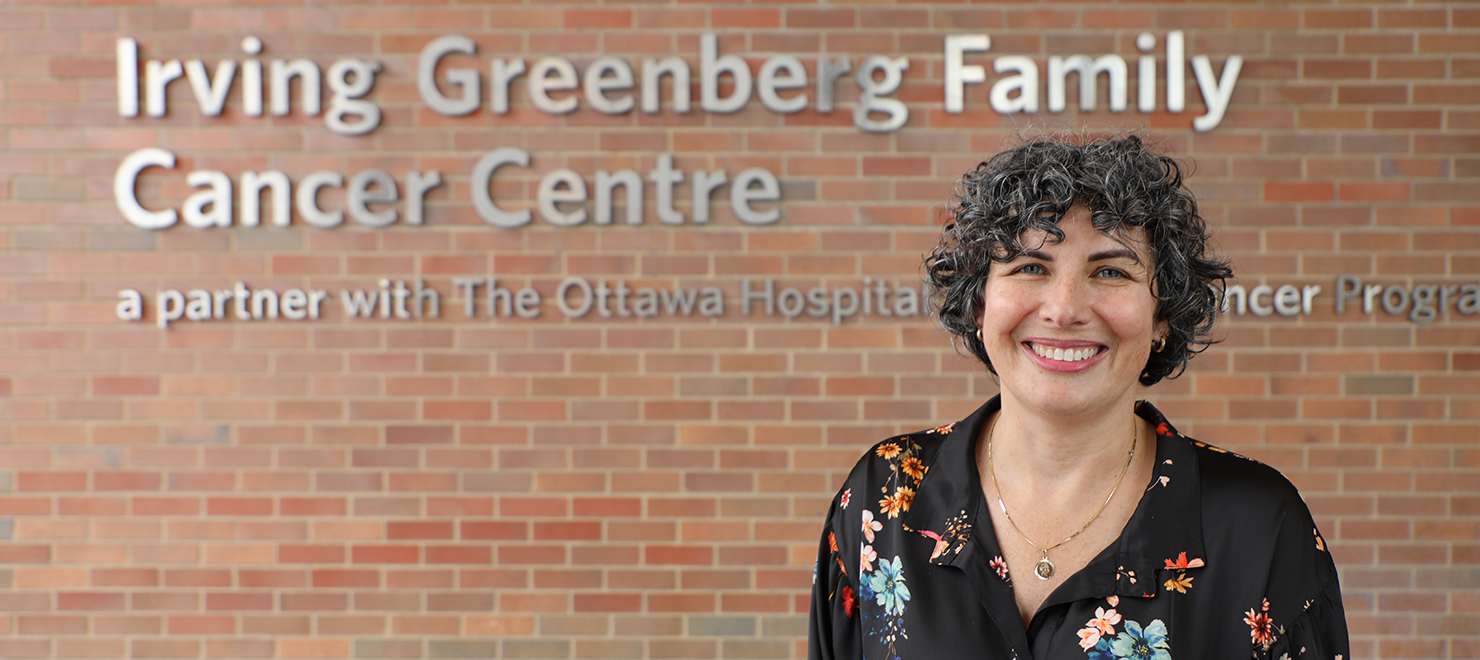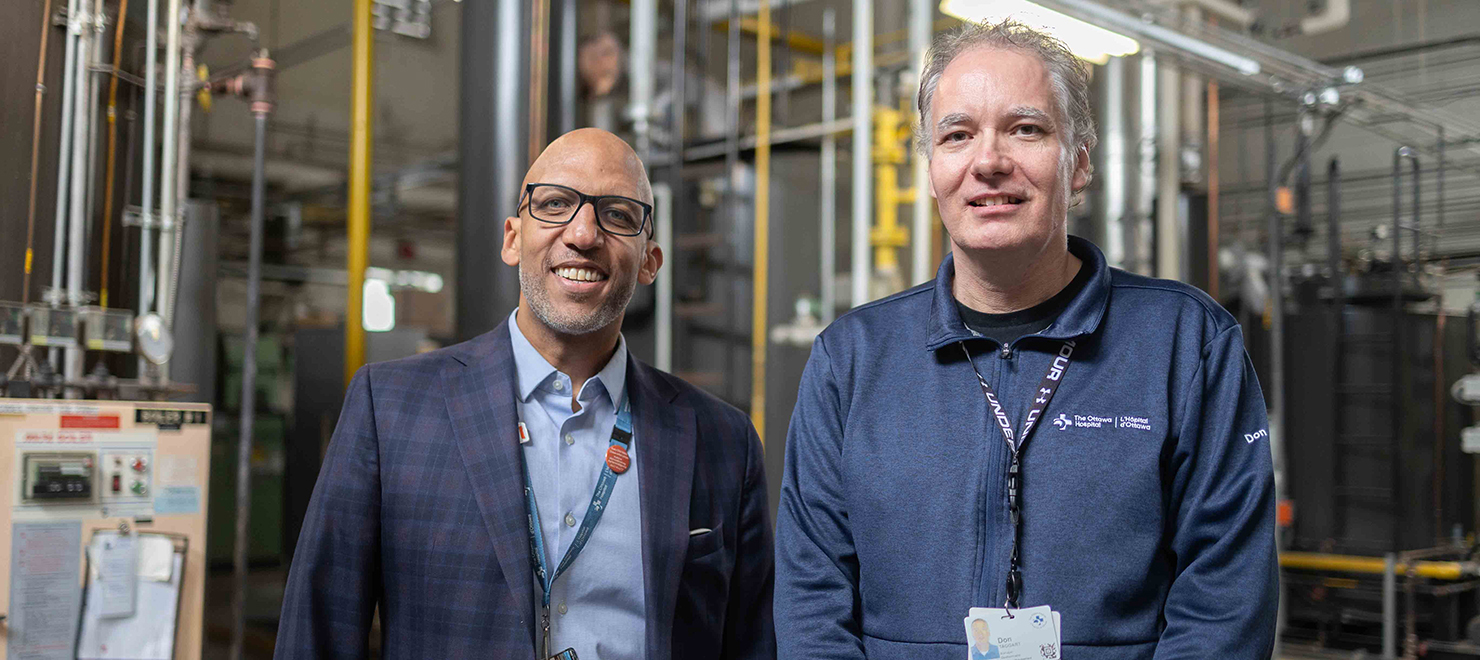
HIP ATTACK to improve patient outcomes
Orthopaedic surgeons are taking part in a study called HIP ATTACK to see how faster access to emergency surgery for broken hips improves care for patients.
When Helen Cameron came to The Ottawa Hospital with a broken hip, she had no idea she would end up being a part of a study aimed at helping other patients. But that is precisely the goal of a new study taking place at the hospital and around the world.
Faster access to emergency surgery is now a proven link to better outcomes for patients, thanks to a study led by The Ottawa Hospital. Soon, health-care professionals will have a specific example of this evidence.
“It’s great to know that The Ottawa Hospital is participating in clinical trials to improve patient care,” said Dr. Bill Cameron. “My mother received excellent care, the staff were so kind and compassionate. But knowing that the quality of care is being evaluated is comforting for all patients here.”
The Hip Fracture Accelerated and Surgical Care Treatment Track (called HIP ATTACK), will study whether patients suffering from a broken hip will benefit from faster access to surgery. Based on a model used by Dr. Antoine Hakim’s stroke code research, this study hopes to speed up the process for hip fracture surgeries, providing better patient care and outcomes.
How did HIP ATTACK start?
Doctors have long known that the patient demographics for hip replacement surgery are similar to those who undergo hip fracture (broken hip) surgery. Yet, the mortality rate for hip fracture surgery was higher than for hip replacement surgery,
Hip fractures put the patient’s body under stress, and often involve bleeding and inflammation. Doctors believe these factors are what likely contribute to the higher mortality rate.
Doctors in Hamilton wondered: If patients received hip fracture surgery faster, would it bring down the mortality rate? That’s when the HIP ATTACK study began to take shape.
What happens in HIP ATTACK?
In 96 sites around the world, including The Ottawa Hospital, patients with broken hips are randomly placed in one of two groups. Those in the accelerated-care group receive emergency surgery within six hours of coming to the hospital. Those in the standard-care group have surgery within 24 to 48 hours (the standard for health care in Canada).
Researchers will study the difference in the rate of complications between the two groups, but patients such as Mrs. Cameron are already seeing the difference that comes with getting into surgery faster.
What’s next?
While the results won’t be available for at least two years, a pilot trial comparing accelerated care and standard care has already shown signs of the results to come.
In the trial, 13 percent fewer patients in the accelerated-care group had major complications compared with the standard-care group. This means that patients who received their emergency surgery faster had a lower chance of surgical complications.
The evidence found in HIP ATTACK will help The Ottawa Hospital, and other health-care facilities, keep innovating to provide the best care possible to patients, here and around the world.

Support patient care and research at
The Ottawa Hospital
You might also like…
By thinking differently, this research team is improving the lives of people with cancer
Taking a different approach to clinical trials, the REthinking Clinical Trials (REaCT) program aims to answer some of the most important and practical questions that affect both patients with cancer and our health-care system. Find out what sets REaCT apart and makes the program so special to participants like Beth.
“Crash testers”: Preparing our health-care teams for real-life emergencies
Swapping patients for manikins, our Simulation Patient Safety Program recreates medical emergencies right in our hospital, allowing our care teams to “crash test” their responses to cardiac arrests, respiratory failures, mass casualty events and more. Dive into this Q&A for a closer look at how this training program enhances patient safety and quality of care.
These nurses invite you to recycle their idea
At The Ottawa Hospital, we strive to lead in sustainable health care — something we can only achieve with the help of our frontline staff. Geriatric medicine nurses Caiti and Sabrina rallied their unit together to optimize recycling and divert waste from the landfill. Find out how they binned it to win it (And we can’t promise you that that’s the last recycling pun in this article!).
After a traumatic brain injury, this physician is on a mission to improve inclusion of docs with disabilities
Motivated by his own experience, Dr. Michael Quon has helped create a new accessibility and accommodation policy for physicians with disabilities in The Ottawa Hospital’s Department of Medicine.
“We never thought we’d save THIS much”: Big win for sustainability at the Riverside Campus
With just a few simple fixes and replacements, our facilities team has massively reduced the carbon footprint at the Riverside Campus — the equivalent of taking 229 cars off the road for a year. So, what’s the team’s secret green sauce? Read this article to find out…
The Ottawa Hospital and YouTube Health partner to increase access to health information in Canada
Looking for health information online can lead you down a rabbit hole of misinformation. That’s why we’ve launched a series of videos with YouTube Health. Presented in both English and French by experts from across The Ottawa Hospital, these videos cover everything you need to know about an array of common medical conditions.


 To reset, hold the Ctrl key, then press 0.
To reset, hold the Ctrl key, then press 0.





